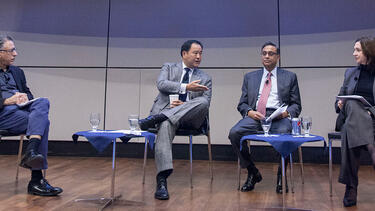Can We Have Your Data, Please?
Top marketing executives discuss big data and how today’s companies are using all of the information they’re collecting about customers.

“These are interesting times in marketing,” said Professor Ravi Dhar as he introduced the Global Markets and Consumers discussion at the Business + Society conference, which marked the opening of Yale SOM’s new Edward P. Evans Hall. Mobile technology, “big data,” and other factors, he pointed out, are multiplying the ways that marketers can understand and reach customers.
Big data, said Jon Iwata, senior vice president for marketing and communications at IBM, is starting to live up to the hype, in part because of the growing number of connected objects, from fitness bracelets to cars. “We can embed computers or sensors into everything,” he said. The sheer mass of data in the world, Iwata said, is growing by 40% a year; 80% of that data is unstructured. Through their behavior in a digital world, customers are “throwing off data.” In the process, they are “declaring their segmentation to us,” and enabling marketers to approach a one-to-one relationship with customers.
Gina Boswell ’89, executive vice president for personal care, North America, at Unilever, said, “To me, it’s what we’re doing with that information that is most exciting, what do we do with the data in real time to influence customer behavior.” For example, she said, Unilever’s TRESemmé brand sets up a “command center” during Fashion Week, combing through and reacting to social media.
The panelists agreed that many of their most important branding efforts fall outside of traditional product advertising. For a financial services company like J.P. Morgan, said CMO Arun Sinha, “it’s branding inside out, not outside in.” That is, the company needs to equip its employees to carry the company’s brand in local interactions with customers.
IBM, Iwata said, has dramatically changed its portfolios of products over its long history, which began with selling coffee grinders and meat slicers, among other kinds of equipment. But, he said, “We haven’t had to rebrand ourselves many times. We’ve never wanted IBM to be defined by what we are selling.” Instead, the company has been defined by its character and the nature of its employees: the “IBMers” familiar from the company’s advertising. “We can put mass marketing out into the world about an employee and not mystify people,” he pointed out.
The conversation drew upon data gathered in real time from audience members through polling technology. For example, Dhar asked audience members to respond to the statement. “I believe that data that companies collect about me and my purchases is protected and secure; 82% disagreed or strongly disagreed. Discussing corporate citizenship efforts, Dhar asked for a response to the statement, “I feel more connected to a global brand when they give back to my local community”; 62% agreed or strongly agreed.